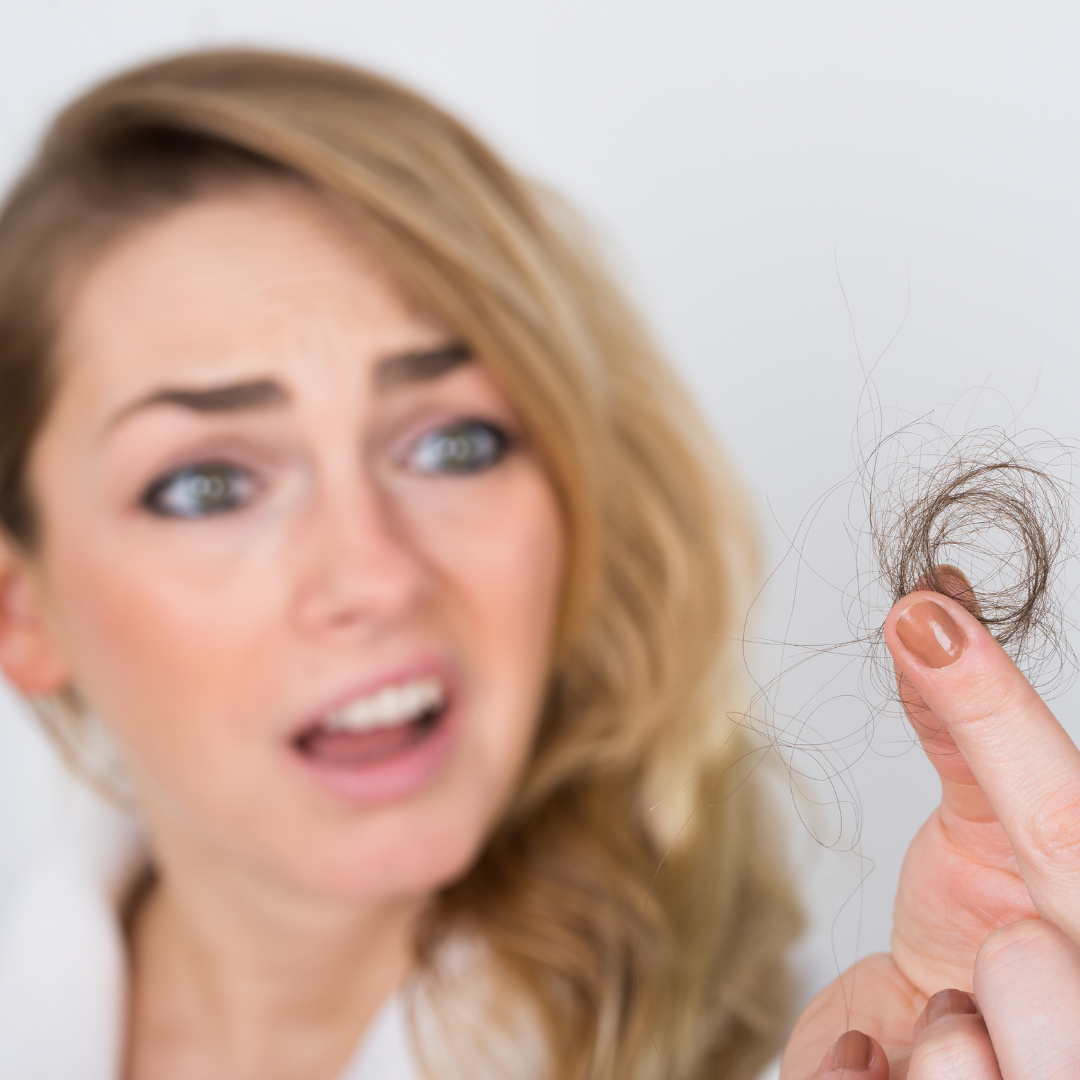
What You Need to Know About Hair Loss
It is normal to shed some hair.
But if you are finding your shower drain is clogged every day or noticing a bald spot or thinning area it can be worrisome.
We all want thick and healthy hair but thinning hair can be a sign of disruption or deficiency that needs to be addressed.
Normal Hair Growth Cycles
We develop our hair follicles in-utero. We have over 5 million hair follicles on our entire body and about 1 million on our heads. These are the most hair follicles we will ever have in our lifetime. As we pass through childhood to adulthood are scalp grows and so our hair follicles space out and our hair thins.
Hair is made up of the follicle which is below the skin edge and the shaft which is the portion of the hair visible above the skin. Hair can grow 0.3 to 0.4 mm per day and up to 6 inches a year. It is normal to shed 50-100 hairs a day as part of a normal hair growth cycle. At any given time hair will be in one of three growth cycles; anagen, catagen, and telogen phases.
Anagen Phase
This is a growing phase, and it can last for 2-8 years. About 85-90% of the hair on your head is in this phase at any given time. During this phase, a new hair will push out the older hair as it comes up through the follicle.
Catagen Phase
This phase is termed the transitional phase. About 6% of the hairs on your head are in this phase. It is a transition phase and can last 2-3 weeks. During this phase the follicles shrink and attach to the root of the hair. This is termed the “club hair”.
Telogen Phase
This phase is termed the resting phase. It is the final cycle of the hair follicle. It accounts for about 6-8% of the hair on your head. During this phase the club hair is completely developed and if the hair comes out you can see the complete shaft with the white root at the end. These are the hairs you lose daily accounting for the 50-100 that leave your head every day.
Factors That Can Affect Normal Hair Cycles
Nutrient Deficiencies
The common causes of hair loss are Androgenetic alopecia (AGA), Alopecia areata (AA), and telogen effluvium (TE). Both can be influenced by nutrient deficiencies of certain minerals and vitamins because vitamins and micronutrients play a major role in the functioning at the level of the hair follicle. . Studies have shown that supplementation can be beneficial when these exist.
The most common nutrient deficiencies related to hair loss are low levels of vitamin D, iron, zinc, B vitamins, and selenium. Iron deficiency is one of the most common deficiencies, especially in women. If low optimizing levels can aid in slowing and reversing hair loss. Anemia can be diagnosed via blood tests including a common complete blood count (CBC) and a ferritin level. When supplementing iron, it is equally important to optimize Vitamin C intake which can optimize iron absorption.
Alopecia areata is an inflammatory condition which attacks hair follicles. Low vitamin D levels have been associated with this condition. When Vitamin D is returned to its optimal levels this condition can be slowed or reversed. Optimal Vitamin D levels should be in the ranges of 50-80 dg/ml and supplementation should be aimed at reaching these levels. Low vitamin D can also be associated with AGA and TE and should be addressed if hair loss is a concern.
Zinc is a trace element and is mostly obtained from meat and fish in the diet. Those who have a diet high in grains, inflammatory bowel issues, or high alcohol intake can be deficient in zinc. Also, those who do not consume meat. Zinc deficiency has been associated with premature graying at the hair follicle and supplementation can slow this process. Alopecia or hair loss is also associated with zinc deficiency.
Zinc has also been shown to block the action of DHT which is an enzyme involved with activating the actions of testosterone at the follicle level. The enzyme activity is associated with an increase in hair loss especially in conditions related to higher testosterone and DHEA levels, like polycystic ovarian syndrome (PCOS). Some individuals can display increase DHT activity even when testosterone levels are normal. Optimizing zinc levels can help to reduce the action of this enzyme on hair loss.
Selenium
A trace element and a powerful antioxidant. It has a role in follicle morphogenesis or growth. Low levels and high levels of selenium are associated with hair loss so supplementation is not recommended as toxicity can occur. If you are looking to get sufficient selenium in your diet, consider eating 3 Brazil nuts every day. This will satisfy the recommended amount.
Essential Fatty acids [EFAs]
( Omega 3-6-9 ) are common deficiencies. A 2017 study published in Nutrient showed up to 98% of participants fell below the optimal range of these important fatty acids and 4 out of 5 had low blood levels. EFA deficiency can lead to loss of hair on the scalp and eyebrows. Studies that applied linoleic acid, one of the fatty acids, topically resulted in hair growth. This is a bit extreme. The best way to get them and reap the other benefits of EFAs is to eat fatty fish, nuts and seeds, avocados and olive oil. Even with careful attention to the diet EFAs usually fall short of optimal ranges so this supports supplementation.
B vitamins
There are 8 water soluble B vitamins B1 ( thiamine ) B2 ( riboflavin ) B3 ( niacin )B5 ( pantothenic acid, B6, B7 ( Biotin ) folate and B12. Causes of B vitamin deficiencies are common in those eating the Standard American Diet ( SAD ) as well as in vegan and vegetarians and those with Inflammatory Bowel disorders. Deficiencies of B vitamins can contribute to hair loss but low folate and B12 are the significant. The only B vitamin that is rarely deficient is Biotin though it is often seen in hair growth supplements. Biotin is made in the gastrointestinal tract by commensal bacteria, so it is rarely low. Taking supplemental biotin can disrupt certain lab tests so taking large doses is not recommended.
Hormone Disruptions and Hair Loss
Your hormones are essentially chemical messengers that regulate just about every single function in your body – and the growth of your hair is no exception. There are a few hormones that play an integral role in the life cycle of your hair follicles, and they are:
- Androgens: Androgens are hormones that are considered “male” sex steroid hormones (although women naturally produce small amounts). If a woman’s hormone balance shifts and she has an increase in certain hormones – specifically testosterone and its derivative dihydrotestosterone – these androgens can bind to the receptors in your scalp follicles and hinder healthy hair growth. This can be seen in conditions like Polycystic Ovarian Disease, Insulin Resistance and Obesity.
- Estrogens: Conversely, estrogens or “female” sex hormones, tend to be more “hair-friendly.” So a dip in estrogen levels can disrupt the normal growth and life cycle of your hair follicles and further contribute to female hair loss. We see drops in estrogen during menopause or during the postpartum period.
- Thyroid Hormones: Your thyroid hormones are essential for the development and maintenance of your hair follicles. Both insufficient and excess levels of thyroid hormones can alter hair growth and function – essentially forcing hair follicles to shift into the telogen or resting phase too soon.4,5 When this happens, your hair follicles fall out sooner than intended. Many nutrient deficiencies previously discussed can be associated with thyroid hormone disruptions too.
- Stress and Cortisol/DHEA: Stress can lead to elevations in levels of Cortisol and Insulin. Both can trigger hair loss by pushing the hair follicles into the telogen phase and eventually pushing them out. Stress can also increase gut dysbiosis and immune disruptions both related to hair loss as well.
Inflammatory Conditions and Hair Loss
The Immune system is important for regulation but many things in our environment and diet can disrupt normal immune functioning. While this is beyond the scope of this article some things which have been shown to cause inflammation and lead to hair loss include the following:
- Inflammatory Bowel Conditions like Crohn’s Disease, Celiac Disease, and Ulcerative Colitis
- Gut dysbiosis (disruption of the balance between healthy or commensal bacteria and inflammatory forms of bacterial species)
- The Standard American Diet (SAD) and its associated refined carbohydrates, hydrogenated vegetable oils, and processed and artificial ingredients
- Toxins in food, the environment, and our hair products. Parabens and phthalates have been associated with inflammation and increase the incidence of autoimmune conditions. Also, think about excessive processing at the hair salon. These products are extremely toxic. That is why your stylist is wearing gloves and a mask.
- Autoimmune disorders like Inflammatory Bowel Disease, Lupus, Hashimoto’s or Graves disease, and Rheumatoid Arthritis.
- Chronic Infections like Candida infections, parasite infections, and chronic viral infections.
- Lack of Sleep. If you watched our sleep programs you know that sleep disorders can disrupt the immune system and increase inflammatory substances known to contribute to hair loss.
[These conditions are best addressed by a Functional Medicine practitioner once more likely culprits are investigated]
Hair Loss is common but before you spend dollars on supplements and hair care products look toward foundational factors that may be contributing. Here are some suggestions to get you started:
- Discuss with your practitioner lab tests that can look deeper into nutritional deficiencies, thyroid disorders, hormone disruptions, insulin resistance, or adrenal disruptions due to stress.
- Adopt a whole foods diet devoid of refined carbohydrates, hydrogenated saturated fats, and artificial ingredients and processing. (Do not know where to start? Check out our Adopting a Whole Foods Plant-Based Diet program or our Food as Medicine program to get support and ideas.)
- Get sufficient sleep. If this is an issue address it for your health. Beautiful hair will be a positive side effect. (Check out our Sleep Fix program if you need a reset.)
- Manage stress with meditation and exercise and consider adrenal support supplements if needed (Klaire Lab Cortisol Manager)
- Minimize your toxic burden. When you replace products make sure they are clean and free of chemicals. If you need help with this, go to the Environmental Working Group site and download their app to scan products and see if they are clean. Talk to your stylist about switching to cleaner products when processing is considered and consider spacing out sessions. (EWG.org )
- Consider adding Hair supportive systems in the short term while you are addressing the important foundational issues leading to hair loss.
- If you are not seeing the changes you want to consider looking deeper with your physician or work with a Functional Medicine Practitioner to address the root cause of the hair loss.



